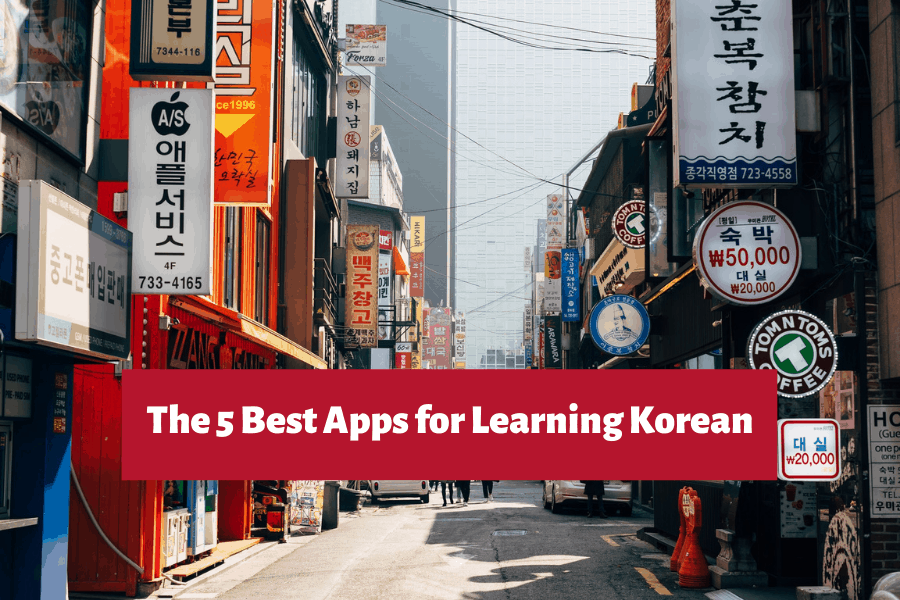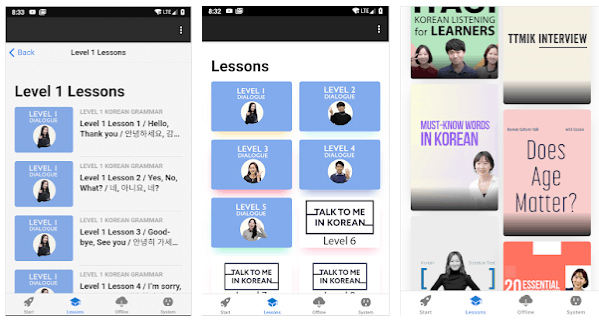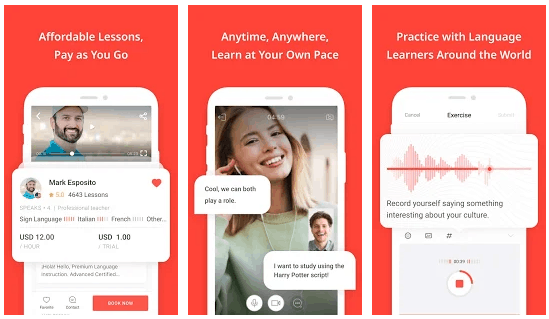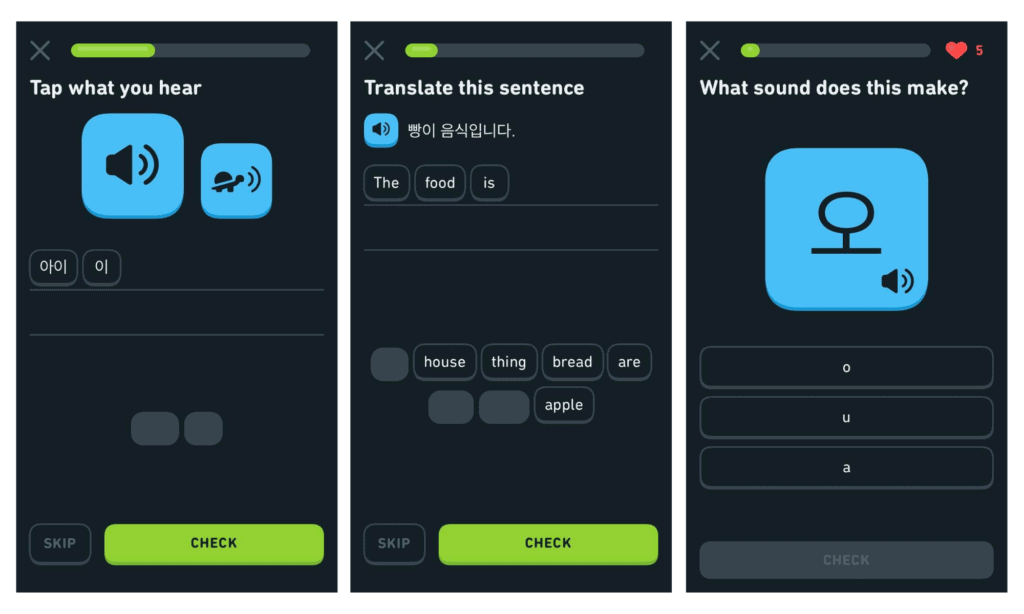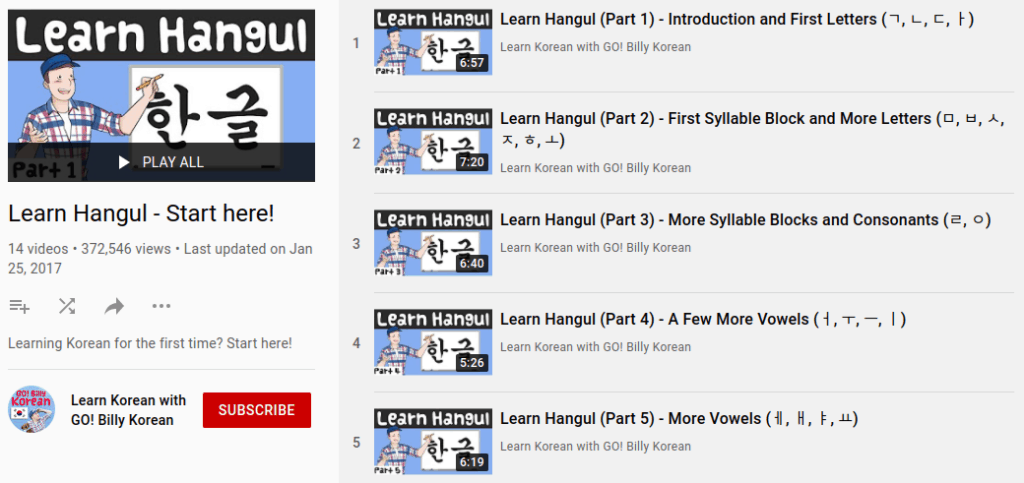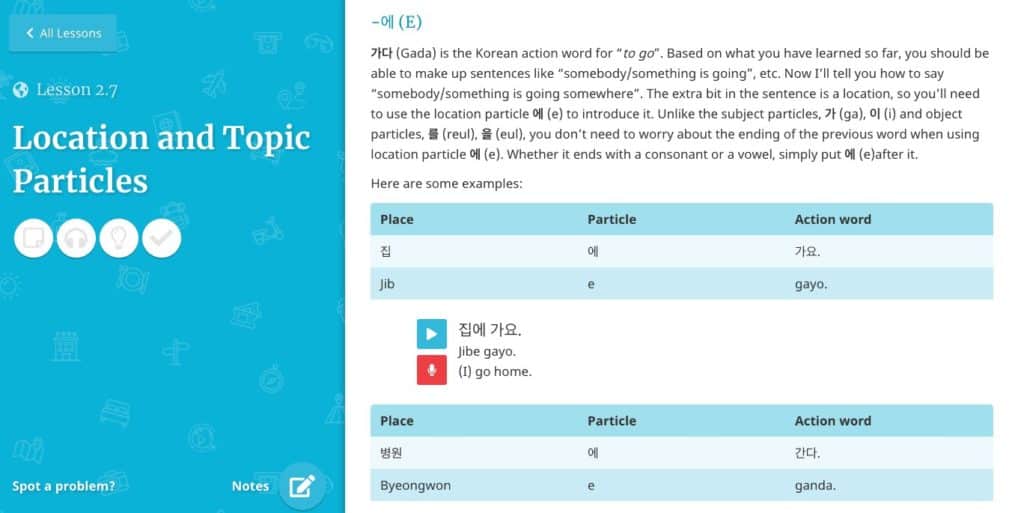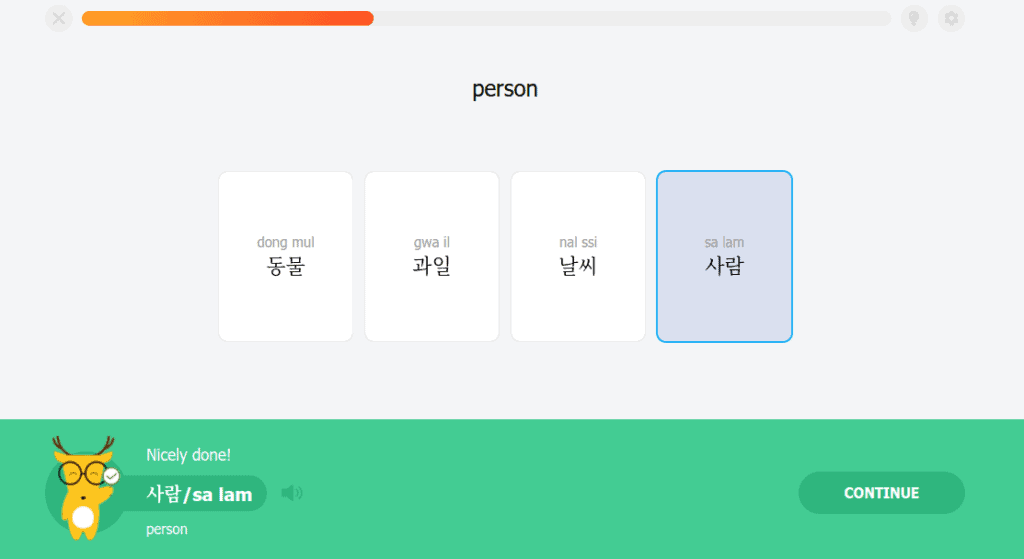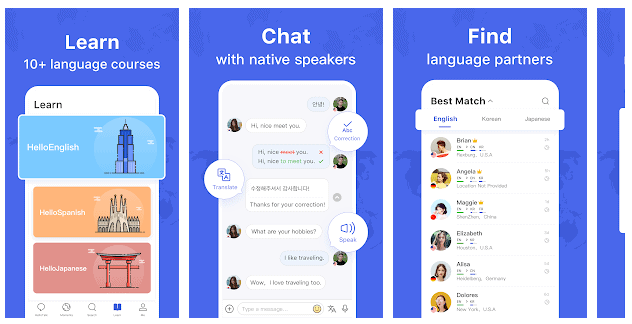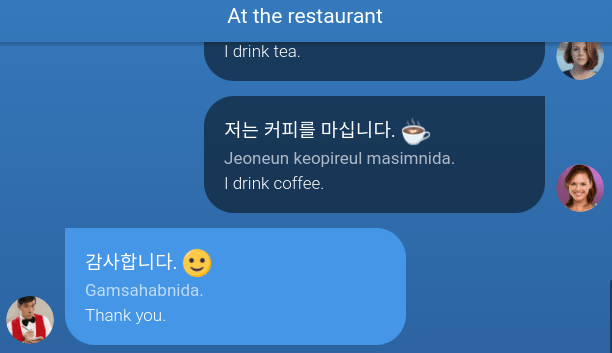When trying to learn to speak Korean on top of your busy life, you may want to find some helpful apps and programs that are convenient, easy-to-use, comprehensive and hopefully, inexpensive. With the dizzying array of resources available, it can be tough to figure out which one will be best for you.
Have no fear; we are here to help. We’ve compiled this list of what we think are the 5 best apps for learning Korean. Keep in mind that not all the apps are structured to teach Korean, and some will simply offer supplemental information alongside some more structured courses. We’ve included some top runners-up at the end of the article, but let’s start with our Best Overall pick, KoreanClass101.
(Android, iPhone, iPad)
Basic membership starts at $8/month, Free 7-day premium trial
Best Overall
KoreanClass101 gets our Best Overall nod for meeting all aforementioned criteria for the best Korean app. There are four monthly-subscription levels including a free account. Each level consists of both video and short podcast lessons complete with full transcripts and quizzes. You will even find a variety of learning games and tools to explore. New content is added regularly, so as long as you maintain your membership, it is unlikely you will run out of new material.
Designed for both casual and serious speakers, from absolute beginner to advanced speaker, KoreanClass101 offers a variety of situational pathway lessons like Speaking Perfect Korean in a Restaurant or Top 10 Lines For Introducing Yourself. Additionally, you can use their guided lesson pathway that is structured to align with the CEFR Levels (Common European Framework for Reference).
Pros
- Variety of language tutors
- Professionally made video/podcast content
- Enormous library of content
Cons
- Syllabus can feel too unclear/disorganised for some learners
- Too much English use & explanations at the lower levels
- Note enough resources for writing
Price:
Effectiveness:
User Experience:
(Android only)
Free
Most Comprehensive
The Korlink App gives you on-the-go access to TalkToMeInKorean.com. Available as a download on Google Play, sorry iOS users, Korlink is currently only available for Android devices and laptops. It offers video lessons of dialogs, lesson notes, quizzes, lesson recommendations and completion certificates.
Additionally, you can download lesson notes to look over whenever you need a review. You must be connected to Wi-Fi or have a data plan to use this app. There are also a few hard-copy books for analogue learners including Real Life Korean Conversations for Beginners and Real Life Korean Conversations for Intermediate.
Pros
- Lots of interesting (and funny) podcasts
- Tutors are free
- They explain real life expressions & situations
Cons
- Audio files can feel a little too long at times
- The learning is generally too passive - not enough speaking or writing practice
Price:
Effectiveness:
User Experience:
(Android, iPhone, iPad)
Free, tutor price varies
Best Korean Tutoring Service
iTalki is a great way to connect with a native Korean speaker right from your phone without the international calling fees! The best part is that you get to look through a list of potential tutors and choose which one is best for you.
Each tutor offers an introduction that includes their main focus while teaching, how much Korean or English they use and their hourly prices. Simply schedule an appointment right on the app, and you only pay for the time you speak with the tutor.
Pros
- Affordable professional tutoring service
- Wide range of tutors to choose from
- Flexible to your schedule and learning needs
Cons
- Lessons can feel unstructured if there's no clear learning goal/lesson plan
- It can take time to find a tutor that you really gel with
Price:
Effectiveness:
User Experience:
(Android, iPhone, iPad)
Free, Duolingo plus costs $6.99 per month (with 7-day free trial)
Best for the Casual Learner on a Budget
If you want a structured, grammatically-focused and in-depth course in Korean, Duolingo is NOT the app for you. However, if you want to brush up on your Korean or learn some casual travel or business phrases, Duolingo is a fun way to do so. It is also an excellent supplemental study-guide for someone already enrolled in a Korean class in a school.
The game-like approach to language learning offers you a variety of activities including matching words to pictures, organizing words to form sentences and even some speaking practice. Duolingo encourages users to keep up a daily study time and rewards lingots (to be spent in the Duolingo store for items like extra lives) for level completion and usage streaks.
Pros
- Very fun - highly gamified and motivating
- Core syllabus is completely free
- Useful for memorising basic phrases
Cons
- Can become very tedious and repetitive
- Answers are often too easy and predictable
- More focused on gamification than real language learning
Price:
Effectiveness:
User Experience:
(Android, iPhone, iPad)
Free – available through the YouTube app
Best for Learning Hangul
Yes, we know this isn’t technically an app, but you can subscribe to Learn Korean with GO! Billy Korean on your YouTube app, and that is good enough for us! Each video in the 14-part series is between five and seven minutes long.
The videos begin with simple letters and gradually build upon those letters to make syllable blocks. Vowels and consonants are thrown in eventually. As you progress, you will learn about double consonants, strong consonants and dipthongs (two vowels in a single syllable). The series wraps up with a variety of sound rule changes and irregulars to offer one of the most comprehensive Hangul writing lessons.
Pros
- Brilliant explanations - simple and easy to follow
- Great for beginners
- Taught from a westerners point of view
Cons
- Passive learning only - should be used as a supplementary resource
- Not much content for advanced learners
Price:
Effectiveness:
User Experience:
Runners-up for Best Korean App
The following runners-up might not have every single bell and whistle of our Top Five, but still deserve an honorable mention.
(Android, iPhone, iPad)
$99.95 for lifetime access, or 6 payments of $19.00 /month
Rocket Korean offers one course that promises to take you from beginner to intermediate Korean speaker. There are over 120 hours of lessons, thousands of voice-recognition phrases to practice, 27 writing lessons and 28 language and culture lessons.
Unlike a monthly subscription program, you only pay once for Rocket Korean. This is great if you don’t like the idea of a monthly bill but want to own the content. Unfortunately, the materials are not regularly updated, so you won’t find new lessons. Essentially, what you buy is what you get.
Pros
- Comprehensive syllabus for beginner to intermediate learners
- Authentic dialogues for a wide range of topics
- Well designed mobile app
Cons
- Topics are not always the most interesting
- The practice exercises can get tedious very quickly
- Forums are inactive/outdated
Price:
Effectiveness:
User Experience:
(Android, iPhone, iPad)
$11.99/mo, $29.99 for 3 months, $55.99 for a year. There’s also a lifetime option for $119.99
LingoDeer is similar to Duolingo in its game-like structure and cute mascot guiding you through the course. It differs in that it offers much more grammatical explanations throughout the activities. Activities include filling in the blank, matching words to definitions and speaking practice. It also offers Learning Tips which helps to explain the history of the language.
LingoDeer is available on a monthly subscription service, but you do not need to be online to use the app. The price point is a bit on the high side when compared to our Top Five. Additionally, some lessons feel a bit out of place. For example, the lesson about Nationalities is first, while Greetings is further down in order.
Pros
- A lot of free content
- Clear grammar explanations
- Exercises are very varied
Cons
- Not as comprehensive as other apps
- Doesn’t help with speaking skills
- Syllabus can feel a bit random at times
Price:
Effectiveness:
User Experience:
(Android, iPhone, iPad)
Free – language exchange app
HelloTalk is an app for both Android and iOS. The free version comes with the beloved advertisements and one language. If you want to be able to communicate in more than one language, you’ll need to sign up for the premium subscription.
HelloTalk will not actually teach you to speak Korean, but it will connect you with native Korean speakers to practice what you already know. Because many language learning programs and apps lack extensive speaking practice, this app is a must for anyone learning Korean.
Additionally, the value of HelloTalk is highly dependent on mass participation. You will be matched with a speaker of your language if there is one available.
Pros
- Great for connecting with real native speakers
- Can make friends and have authentic cultural exchanges
- Built-in translation and error-correction
Cons
- You must spend at least an equal amount of time helping your partner to speak English (or any other language you already know)
- Partners can often be unreliable or have different expectations to you
Price:
Effectiveness:
User Experience:
(Android, iPhone, iPad)
$9.99/month or $47.99 for one year of Korean, 7-day free trial
Mondly is slightly different from other programs and apps in that it encourages you to learn to speak a new language from your native tongue. So, if you are a native French speaker, you will go between French and Korean. The lessons are not structured in an orderly manner, so this is most likely a better app for casual learners wanting to study travel phrases or greetings.
Mondly excels at enhancing your vocabulary, so serious students may consider it as a supplemental resource only. This monthly-subscription program gives you access to a variety of lessons, monthly challenges and weekly assessments.
Pros
- Nice use of augmented and virtual reality
- Caters for both adult and young learners
- Well designed app
Cons
- Cannot slow down audio
- Lacking in detailed grammar explanations
- Not enough advanced content
Price:
Effectiveness:
User Experience:
Conclusion: The 5 Best Apps For Learning Korean
Well, there you have it. KoreanClass101 gets the nod for best overall, Korlink for most comprehensive, italki and Duolingo come in a respectable 3rd and 4th place, and rounding out the top 5 is the best app for learning to write, Learn Hangul.
What are your favorites? Did they match ours?

Josiah is a digital nomad with a passion for language learning and adventure travel. He’s taught English as a foreign language for many years and is currently learning Georgian, French and Chinese.
